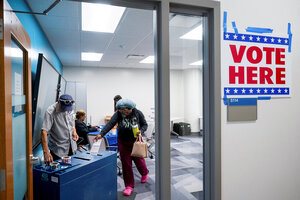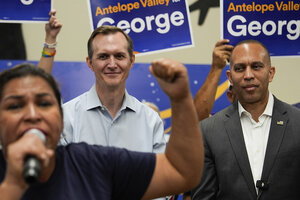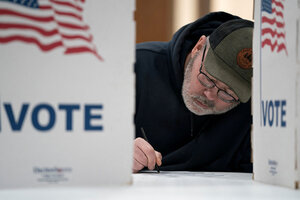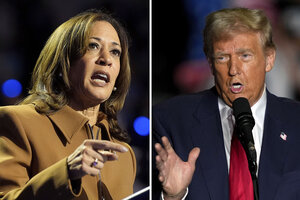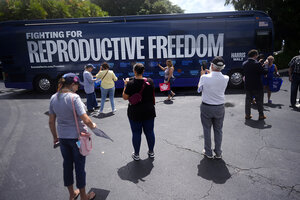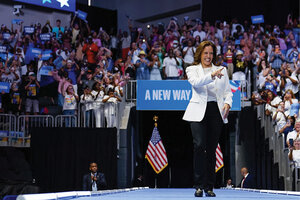Five takeaways from the Democratic National Convention
| Chicago
The 2024 Democratic National Convention is officially in the books.
Just one month after Vice President Kamala Harris became the Democratic standard-bearer – and with less than three months until the election – the four-day gathering of party faithful gave Ms. Harris and Democrats a prime opportunity to reintroduce her to the nation and woo undecided voters.
Here are some of the main themes and memorable moments – what the Democrats talked about, and what they avoided.
Filling in Harris’ biography
Most Americans are still getting to know Ms. Harris – and the race for the White House may be decided by the race to define her. More than one-third of Americans say that they still don’t know what Ms. Harris stands for, according to a recent CBS poll. This convention sought to answer that question, with countless speakers talking about her personal biography and her work as a prosecutor and California attorney general.
The speakers, and Ms. Harris herself, talked a lot about her middle-class upbringing – how hard it was for her single mother to save enough money to buy a home, how the vice president worked at McDonald’s during college.
She used that history to argue that she’ll fight hard for working Americans, promising to fight to lower costs on items like health care and groceries and pledging to “end America’s housing shortage.”
“Building that middle class will be a defining goal of my presidency,” Ms. Harris said. “This is personal for me. The middle class is where I come from. My mother kept a strict budget. We lived within our means. Yet, we wanted for little. And she expected us to make the most of the opportunities that were available to us, and to be grateful for them, because opportunity is not available to everyone.”
The convention also repeatedly highlighted Ms. Harris’ background as a prosecutor and former California attorney general who cracked down on sexual predators and transnational gangs. She also fought to force big banks into a massive settlement with California homeowners for their role in the 2008 foreclosure crisis.
A survivor of sex trafficking spoke and credited Ms. Harris for fighting to protect people like her. And Ms. Harris’ best friend in high school, Wanda, told the story of how Ms. Harris invited her to live with her family when she found out that Wanda was being sexually abused by her stepfather.
Democrats showcase a different kind of masculinity
At the Republican National Convention, machismo ruled. Former President Donald Trump’s walkout music one night was James Brown’s “It’s a Man’s Man’s Man’s World.” The GOP convention, held just days after Mr. Trump survived an assassination attempt, frequently replayed his response of raising his fist, with blood on his face, and yelling “Fight! Fight! Fight!” His two adult sons had prominent speaking roles, while neither his wife nor his two daughters spoke (one granddaughter did give a short speech). The top-billed celebrity guests on the final night of the convention were the trio of singer Kid Rock, Ultimate Fighting Championship owner Dana White, and wrestler Hulk Hogan, who literally ripped his shirt open onstage.
Democrats took a different approach.
Ms. Harris’ husband Doug Emhoff, the first second gentleman in U.S. history, spoke lovingly and devotedly about his wife. And he praised her and his ex-wife – who was in attendance showing her support – for making their blended family work.
“Those of you who belong to blended families know that they can be complicated. But as soon as our kids started calling her ‘Momala,’ I knew we’d be okay,” he said. Mr. Emhoff’s kids praised him for making sacrifices for Ms. Harris, pointing out that he’d left his job as a high-powered lawyer to support her career when she became vice president.
Minnesota Gov. Tim Walz, Ms. Harris’ running mate, leaned into his coach persona – he was introduced by his former high school football players and ended his remarks with a riff on a locker-room speech. But he also talked with open emotion about the difficulties he and his wife had in conceiving children, and their use of fertility treatments to create their family. “Hope, Gus, and Gwen, you are my entire world, and I love you,” Mr. Walz said.
His teenage son Gus, who was diagnosed with a nonverbal learning disorder, stood up, tears streaming down his face, and repeatedly mouthing “That’s my dad!”
A heavy emphasis on abortion rights
Abortion access has been at the center of Democrats’ campaigns ever since former President Trump’s Supreme Court appointees helped end the national right to an abortion. The issue has become an even clearer focus of the presidential race since Ms. Harris became the nominee.
Multiple women spoke about how their states’ laws restricting abortion had put their lives at risk, or forced them to travel for abortions after being raped.
Oprah Winfrey hit hard on the topic. “If you cannot control when and how you choose to bring your children into this world and how they are raised and supported, there is no American dream,” she said.
Ms. Harris told the audience that Mr. Trump and his allies weren’t done, warning that if elected he would limit birth control, ban medication abortion, and enact a nationwide abortion ban. “And get this,” she added. “He plans to create a national anti-abortion coordinator and force states to report women’s miscarriages and abortions. Simply put, they are out of their minds.”
Skirting around Gaza
The convention’s speakers largely avoided the issue that has created the greatest fissure in the Democratic Party this year: Israel’s war in Gaza.
Very few Democrats brought up the crisis from the stage. And while Ms. Harris addressed the issue herself during the speech, she hewed closely to previous remarks. She said she and President Joe Biden were “working around the clock” on a ceasefire. She pledged her support for Israel’s right to defend itself, and talked about the horrific terror acts committed last October in Israel, but also lamented that “the scale of suffering is heartbreaking” in Gaza. It was notable that one of Ms. Harris’ loudest applause lines was when she discussed the plight of the Palestinian civilians.
The hard-core anti-Israel protesters outside the convention were never going to accept anything but a full pivot from Ms. Harris. But pro-Palestinian Democratic delegates who wanted to find a way to support Ms. Harris were left frustrated, too. Three dozen “uncommitted” Democratic delegates who won their roles to the convention as a Gaza protest had asked for speech time for a Palestinian American to address the ongoing horrors facing Gaza’s civilian population. The convention denied them that, even as it gave a speaking slot to an Israeli American couple whose son was taken hostage in Gaza.
That led to a sit-in protest from those uncommitted delegates outside the United Center.
The Obamas warn Democrats not to abandon the center
It was striking how jubilant Democrats seemed at this convention, just one month removed from the total despondency many displayed before Mr. Biden’s exit from the race. But two of their favorite figures took the stage to warn them against self-destructive behaviors that could lose what’s essentially a tied race.
Both former President Barack Obama and former first lady Michelle Obama told their fellow Democrats on Tuesday not to alienate possible allies – or be reluctant to fight hard to elect Ms. Harris just because they didn’t agree with everything she stood for.
“Our politics have become so polarized these days that all of us across the political spectrum seem so quick to assume the worst in others unless they agree with us on every single issue. We start thinking that the only way to win is to scold and shame and out-yell the other side. And after a while, regular folks just tune out,” the former president warned. “If a parent or grandparent occasionally says something that makes us cringe, we don’t automatically assume they’re bad people. We recognize that the world is moving fast, that they need time and maybe a little encouragement to catch up. Our fellow citizens deserve the same grace we hope they’ll extend to us. That’s how we can build a true Democratic majority, one that can get things done.”
Mrs. Obama made a similar point.
“We cannot be our own worst enemies,” she said. “We cannot get a Goldilocks complex about whether everything is just right. And we cannot indulge our anxieties about whether this country will elect someone like Kamala, instead of doing everything we can to get someone like Kamala elected.”







